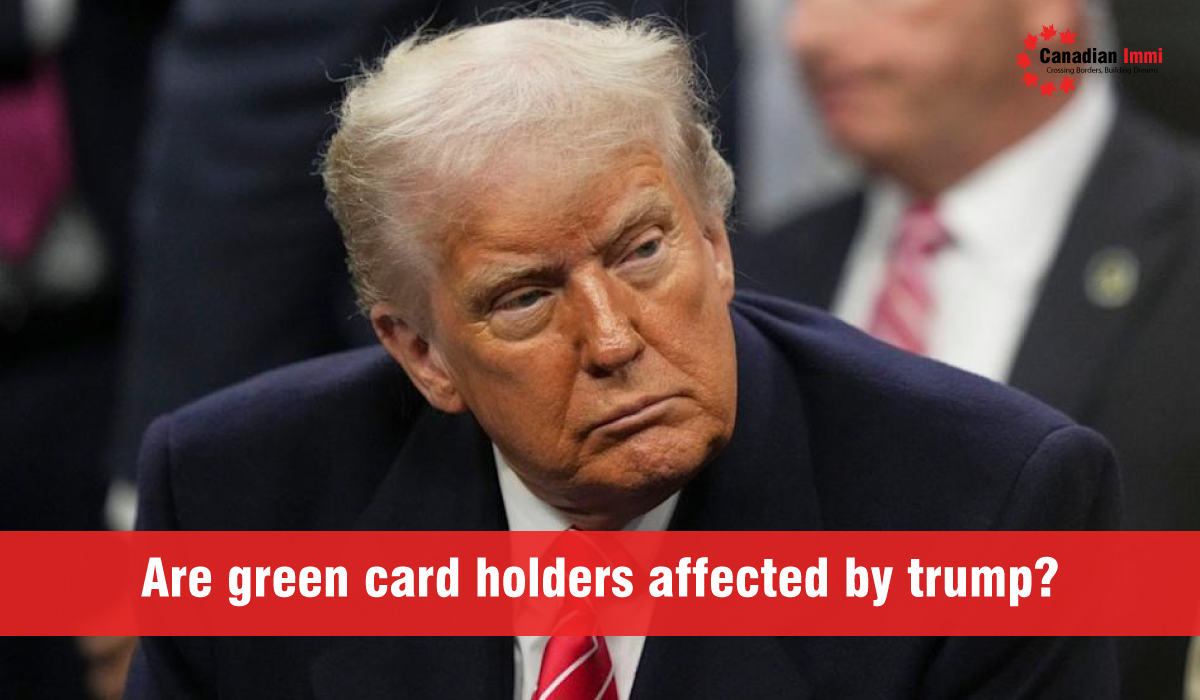Green card holders, also known as lawful permanent residents (LPRs), are individuals who have been granted the right to live and work in the United States indefinitely. Over the years, discussions surrounding the policies of former President Donald Trump have raised questions about how these policies may impact green card holders. However, it’s important to recognize that the effects on green card holders depend on a variety of factors, including the specific policies that were enacted and the evolving legal and political landscape.
1. Immigration Policies Under Trump
One of the most significant areas where green card holders may have been affected during Donald Trump’s presidency was immigration policy. Trump’s administration focused heavily on immigration enforcement, often making headlines with measures that targeted undocumented immigrants, refugees, and asylum seekers. While green card holders themselves are not typically subject to deportation unless they commit certain crimes, Trump’s policies did create a more stringent environment for all immigrants, including LPRs.
For example, in 2017, Trump introduced the “Muslim Ban,” which restricted travel from several predominantly Muslim countries. Although green card holders were generally exempt from this ban, it still raised concerns about the future of visa and green card issuance, especially for individuals from affected countries. Additionally, the administration imposed heightened scrutiny on visa applications, which indirectly impacted green card holders, especially those looking to bring family members to the U.S. through family-sponsored immigration.
2. Public Charge Rule green card holders affected by trump
Another policy that gained significant attention was the “public charge” rule, which aimed to prevent immigrants who might rely on public benefits like food assistance or Medicaid from obtaining green cards. While the rule did not directly affect green card holders who had already received their status, it did create new hurdles for people seeking to adjust their status from temporary to permanent residency. Under this policy, individuals could be denied a green card if they were deemed likely to become a public charge.
While the public charge rule has faced legal challenges and was eventually overturned by the Biden administration, its impact on those in the process of obtaining a green card was significant, creating uncertainty and stress for many applicants.
3. DACA and Temporary Protected Status (TPS) Holders
Trump’s administration also took actions against certain groups that indirectly affected green card holders. For example, the cancellation of the Deferred Action for Childhood Arrivals (DACA) program created concerns for many undocumented immigrants who were brought to the U.S. as children. These individuals were ineligible for green cards until a resolution was found in Congress, leaving them in a precarious situation.
Additionally, the administration took steps to limit Temporary Protected Status (TPS) for individuals from certain countries, affecting thousands of immigrants, some of whom may have been married to or family members of green card holders. While the direct impact on green card holders was limited, it contributed to an overall atmosphere of uncertainty and fear among immigrant communities.
4. Increased Deportations green card holders affected by trump
Although green card holders have certain legal protections, they are not immune from deportation if they commit serious crimes. During Trump’s presidency, there was a significant increase in immigration enforcement, which resulted in more deportations of legal permanent residents who had criminal convictions. While this measure was intended to target individuals who posed a threat to public safety, it did raise concerns among green card holders who may have minor offenses on their records. The heightened focus on criminal convictions, including those that might have been overlooked in the past, led to a sense of vulnerability among some green card holders.
5. Broader Political Climate
The political climate during Trump’s presidency also had an emotional and psychological impact on immigrant communities, including green card holders. The rhetoric used by Trump, particularly during his presidential campaigns, often framed immigration as a threat. This stoked fear and division within the country, and many green card holders felt a sense of insecurity despite their lawful status. In addition, the uncertainty surrounding potential changes in immigration laws and policies led to anxiety about their long-term future in the U.S.
6. What Does the Future Hold?
With President Biden’s administration taking office in January 2021, some of the policies that were introduced under Trump have been reversed or re-evaluated. For instance, the public charge rule was rescinded, and efforts have been made to reunite families separated under previous immigration policies. These changes have provided some relief to green card holders and prospective immigrants alike. However, immigration remains a contentious issue in U.S. politics, and future administrations may introduce new measures that could again affect green card holders.
Conclusion
In summary, while green card holders were not directly targeted by most of Donald Trump’s policies, the broader atmosphere of heightened immigration enforcement, legal challenges, and uncertainty created a difficult environment for many. It’s important for green card holders to stay informed about changes in immigration law and policy, as these shifts can directly or indirectly affect their rights, opportunities, and the security of their status in the U.S. Ultimately, the impact of Trump’s presidency on green card holders is complex, and it highlights the ongoing debates around immigration policy in America.

